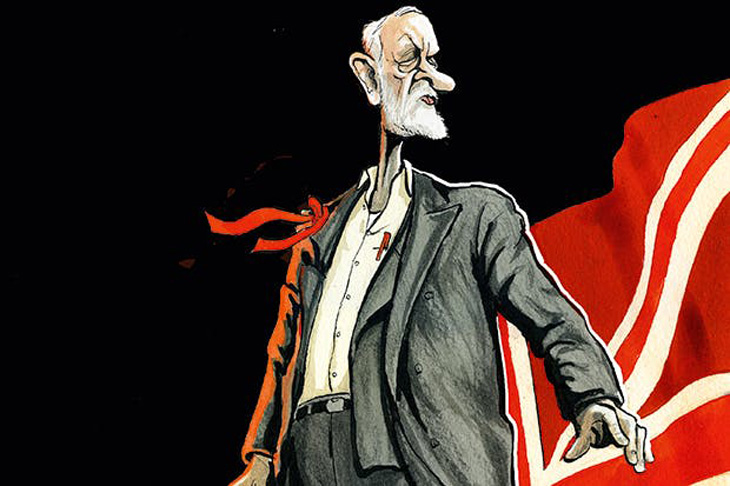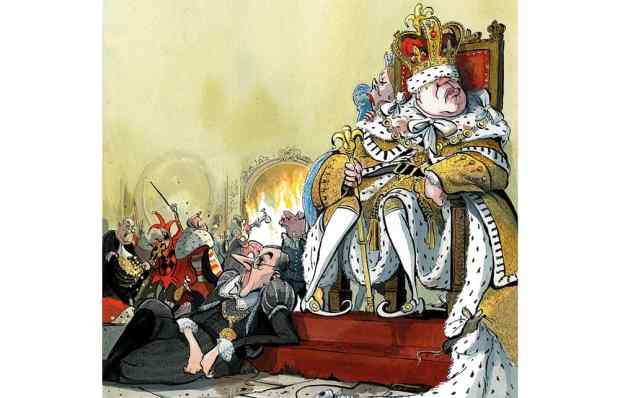The worst of Britain’s post-war mistakes, ideas we thought long dead, are once more in the air. Yet again there are plans for ‘workers on boards’ (the govern-ment, of course decides who’s a worker), and for mandatory price caps, based on the delusion that government can make things cheaper by diktat. Intelligent people are once more agreed that British employers should pay the highest minimum wage in the developed world — a policy estimated to condemn tens of thousands to unemployment. The tax burden is at a 30-year high, yet many assume we should make that burden still heavier — as if the country can be taxed to prosperity.
The Labour party has been pontificating along these lines in Liverpool all week, but these are in fact Tory ideas. Yes, John McDonnell goes much further — but Theresa May is on the same path. It makes it very difficult for her to point out how very dangerous and damaging these ideas might be.
Labour’s proposal for confiscating one in ten shares held in large companies and handing them to an ‘inclusive ownership fund’ is nonsense. But it’s the sort of nonsense that would have fitted quite easily into the 2017 Tory manifesto. If British politics is shifting to the left, it’s the Conservatives, more than anyone, who have pushed it that way.
The Tory excuse, in last year’s election, was that these moves to the left were strategic. They assumed that by raiding Ed Miliband’s manifesto, they would somehow weaken Labour support and steal his voters. But voters are not quite that simple. We can see through political gimmicks and anyway, why wouldn’t those of us inclined to think that Britain needs higher taxes, more government spending and greater state interference, simply vote Labour?
As the Conservatives gather in Birmingham this weekend, they have a lot of thinking to do. They have, in Labour, a well-organised opposition with a clearly articulated vision. Jeremy Corbyn promises ‘radical socialism’ and John McDonnell delights in spelling out what this would mean. The vast cost of re-nationalising water, rail and power industries is spoken of as a virtue. The question, says McDonnell, is not whether we can afford to do it — but whether we can afford not to do it. He sounds credible because he believes it.
Corbyn’s ideas are populist, but they are also popular. Opinion polls show broad public support for the share confiscation scheme and for renationalising the railways. Years of failing to make the case for basic liberty and the free enterprise system; years of stealing Labour policies in pursuit of electoral advantage have left the Conservatives unable to explain why Corbyn’s wrong. And they have no competing philosophy, let alone a compelling one. Brexit seems to have not just divided, but lobotomised the Tory party.
Theresa May’s deputy David Lidington insists that voters are more interested in housing, schools, hospitals and social care than in the details of Britain’s post–Brexit customs arrangements. He might be right, but then the Tories’ housing agenda is completely inadequate to the size of the challenge. Labour is threatening to close the free schools and academies which have done so much to drive up standards, but our Education Secretary has done nothing to defend them. He’s anonymous and absent from the field of political battle. On health, Mrs May talks as if what matters is how much is spent on the NHS, not what it delivers. But if that is the case, why shouldn’t voters opt for the party that proposes to spend the most? On social care, we are still waiting for a Tory policy after the disaster of the dementia tax.
This week, a record number of teenagers from disadvantaged backgrounds will start university. And why? Because Tory reforms to university finance have led to a massive expansion of university places. Britain is finding (as Ireland found) that tuition fees expand opportunity. In Scotland, where state-funded fees mean state rationing of places, poorer pupils suffer. And yet the Tories cannot bring themselves to make even this basic point.
The Conservatives have, in Theresa May, a leader of uncommon resilience, but she joined the Tory party before Margaret Thatcher became prime minister — and it shows. Her thinking owes far too much to Ted Heath and his corporatist world view.
Not so long ago, Mrs May was expected to quit in Easter next year after delivering Brexit. She should. The party could then find a leader in possession of a domestic agenda: the first step to seeing off the Corbynite threat. There are only three-and-a-half years to the next election, and by then the Tories will need to have shown that popular capitalism can deliver for the many. That won’t happen under the current leadership. The Tories need someone who can defend not only the party, but the philosophy on which it is based. If Mrs May stays on the grounds that Brexit is not yet settled, it will be to the detriment of her party and the country.
Got something to add? Join the discussion and comment below.
Get 10 issues for just $10
Subscribe to The Spectator Australia today for the next 10 magazine issues, plus full online access, for just $10.
You might disagree with half of it, but you’ll enjoy reading all of it. Try your first month for free, then just $2 a week for the remainder of your first year.














Comments
Don't miss out
Join the conversation with other Spectator Australia readers. Subscribe to leave a comment.
SUBSCRIBEAlready a subscriber? Log in